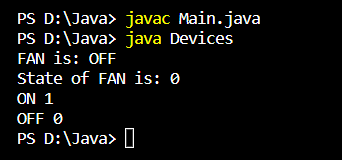Array Declarations
- Arrays are objects that store multiple variables of the same type, or variables that are all subclasses of the same type.
- Arrays can hold either primitives or object references, but the array itself will always be an object on the heap, even if the array is declared to hold primitive elements.
- Arrays are declared by stating the type of elements the array will hold, followed by square brackets to either side of an identifier.
- It is never legal to include the size of the array in our declaration. The JVM doesn't allocate space until we actually instantiate the array object.
class Array {
int a[];
double[] b;
char[] c[];
String[][] d;
Short e[][];
}
Enum Declarations
- An enum specifies a list of constant values assigned to a type.
- An enum is not a String or an int; an enum constant's type is the enum type.
- Enums can be declared as their own separate class, or a class member or within a method.
- The syntax for accessing an enum's members depends on where the enum was declared.
- An enum is a special kind of class, we can do more than just list the enumerated values.
- We can add constructors, instance variables, methods, and something really strange known as a constant specific class body.
- We can NEVER invoke an enum constructor directly. The enum constructor is invoked automatically, with the arguments we define after the constant value.
- We can define more than one argument to the constructor, and we can overload the enum constructor.
enum DeviceState {
ON(1), OFF(0);
private int state;
DeviceState(int state) {
this.state = state;
}
public int getState() {
return state;
}
}
class Devices {
DeviceState state;
public static void main(String[] args) {
Devices fan = new Devices();
fan.state = DeviceState.OFF;
System.out.println("FAN is: " + fan.state);
System.out.println("State of FAN is: " + fan.state.getState());
for (DeviceState state : DeviceState.values()) {
System.out.println(state + " " + state.getState());
}
}
}


Comments
Post a Comment